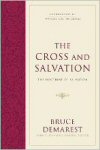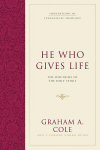Foundations of Evangelical Theology Series (7 vols.)
Digital Logos Edition
Overview
It is the job of all believers, not just theologians, to serve God by discerning what is true about the crucial issues of life. Our task is to learn more about God. Our privilege is to love God passionately with our minds. Clearly then, spiritual life must have theology as one of its ingredients. The Foundations of Evangelical Theology series includes three volumes designed to support your study of theology and clarify the essential doctrines of your faith. Each book in the Foundations of Evangelical Theology series contains carefully constructed doctrinal statements that you can defend, live out, and communicate to others.
This title is included in the following collections
You can save when you purchase this product as part of a collection.
Foundations of Evangelical The...
$228.91$193.99Crossway Systematic Theology C...
$1,108.60$829.99Crossway Studies in Theology (...
$1,681.23$1,379.99

- Discusses a wide collection of issues in systematic theology
- Explores the being, nature, and acts of God in all three Persons
- Provides practical applications for Christian living
- Title: Foundations of Evangelical Theology Series
- Series: Foundations of Evangelical Theology
- Series Editor: John S. Feinberg
- Publisher: Crossway
- Volumes: 7
- Pages: 1,743
- Language: English
- Format: Logos digital
- Christian Group: Evangelicals
- Types: Systematic Theologies > Systematic Theology Series
- Topics: Theology > Systematic Theology
- The Cross and Salvation: The Doctrine of Salvation by Bruce Demarest
- God the Son Incarnate: The Doctrine of Christ by Stephen J. Wellum
- Sojourners and Strangers: The Doctrine of the Church by Gregg R. Allison
- He Who Gives Life: The Doctrine of the Holy Spirit by Graham A. Cole
- Light in a Dark Place: The Doctrine of Scripture by John S. Feinberg
- No One Like Him: The Doctrine of God by John S. Feinberg
- To Know and Love God: Method for Theology by David K. Clark

Bruce Demarest has made plain God’s glorious plan of salvation, his provision for the human dilemma through Christ’s work on the cross, and the application of saving grace to unbelievers. Demarest’s unique approach defines each topic, identifies its most pressing issues, examines the ways in which the doctrine has been understood historically, and interprets the Bible’s revelation. The result is a clear and carefully constructed doctrinal statement that you can defend, live out, and communicate to others.
With America’s confidence in the Bible at an all-time low and the strength of her spiritual convictions waning, it is essential for Christians—especially Christian leaders—to be well-grounded in biblical theology, and to have a clear and comprehensive understanding of the key doctrines of evangelicalism.
This singular, comprehensive treatment of one of Christianity’s essential doctrines gives definitive, Bible-based answers about salvation and the cross—and about related theological issues such as grace and regeneration. It’s perfect for clarifying your theology and gaining deep understanding of this foundational theme.
A very good book about that most distinctive and vital Christian doctrine: salvation in Christ. . . . I can imagine more than one teacher (myself included) considering the construction of an entire course around this book. . . . Moreover, Demarest’s competence in several disciplines means the work would stretch even advanced students into that integration of biblical foundations, theology (including theology in its historical dimensions), and personal/ministry application for which we all surely long.
—Bob Robinson, Biblioteca Sacra
A valuable contribution to the evangelical theological community. Lucid and readable, Demarest’s work is an encyclopedic approach to the subject, which results in a good sourcebook on the major options in the hotly contested doctrines of soteriology. Demarest’s treatment of such issues as lordship salvation, the nature of repentance, and various views of sanctification indicate his familiarity with the various options. Although no reader will agree with every theological position Demarest adopts, his explanations of views with which he disagrees seem fair. . . . It would make an excellent textbook for seminary or graduate courses in soteriology and a helpful addition to any pastor’s library.
—Glenn R. Kreider, Journal of Evangelical Theological Society
Bruce Demarest was educated at Wheaton College and Trinity Evangelical Divinity School. He earned his doctorate in biblical and historical theology at the University of Manchester, where he was mentored by Professor F. F. Bruce. Bruce spent 10 years working with evangelical missions organizations and also has taught at numerous evangelical seminaries throughout the United States, Canada, the Middle East, and Asia. A professor at Denver Seminary, he is the author of 15 books and has written for national publications such as Christianity Today, Foundation, Reflections, and Criswell Theological Review.

Nothing is more important than what a person believes about Jesus Christ. To understand Christ correctly is to understand the very heart of God, Scripture, and the gospel. To get to the core of this belief, this latest volume in the Foundations of Evangelical Theology series lays out a systematic summary of Christology from philosophical, biblical, and historical perspectives—concluding that Jesus Christ is God the Son incarnate, both fully divine and fully human. Readers will learn to better know, love, trust, and obey Christ—unashamed to proclaim him as the only Lord and Savior.
Exploring our Lord’s person and work from a variety of angles, Wellum engages a wide range of issues and conversation partners. Consolidating the gains of evangelical Christological reflection, this volume makes gains of its own, particularly by wrestling clearly and carefully with contemporary trends in biblical studies as well as philosophical, systematic, and historical theology.
—Michael Horton, J. Gresham Machen Professor of Systematic Theology, Westminster Seminary California
Stephen J. Wellum (PhD, Trinity Evangelical Divinity School) is professor of Christian theology at the Southern Baptist Theological Seminary in Louisville, Kentucky, and editor of the Southern Baptist Journal of Theology.

What is a church? This can be a difficult question to answer and Christians have offered a variety of perspectives. Gregg Allison explores and synthesizes all that Scripture affirms about the new covenant people of God, capturing a full picture of the biblical church. He covers the topics of the church’s identity and characteristics; its growth through purity, unity, and discipline; its offices and leadership structures; its ordinances of baptism and the Lord’s Supper; and its ministries. Here is a rich approach to ecclesiology consisting of sustained doctrinal reflection and wise, practical application.
I believe that the doctrine of the church will be the most urgent locus of theological reflection over the next generation. In Sojourners and Strangers, Gregg Allison clears the ground by presenting a thoroughly biblical ecclesiology, at once comprehensive in scope and sensitive to nuance. A welcome addition to an important series.
—Timothy George, founding dean, Beeson Divinity School
Gregg R. Allison is professor of Christian theology at The Southern Baptist Theological Seminary. He is secretary of the Evangelical Theological Society, a book review editor for the Journal of the Evangelical Theological Society, an elder at Sojourn Community Church, and a theological strategist for Sojourn Network. Allison has taught at several colleges and seminaries, including Western Seminary in Portland, Oregon, and Trinity Evangelical Divinity School in Deerfield, Illinois, and is the author of numerous books, including Historical Theology: An Introduction to Christian Doctrine, Sojourners and Strangers: The Doctrine of the Church, and Roman Catholic Theology and Practice: An Evangelical Assessment.

Often the most misunderstood and ignored member of the Trinity, the Holy Spirit deserves our attention and understanding. In He Who Gives Life: The Doctrine of the Holy Spirit, author Graham Cole provides a comprehensive theology of the Holy Spirit. Cole illustrates the ultimate selflessness of the Holy Spirit as the member of the Trinity who always works for the glory of God the Father and God the Son and the good of the saints. A superb theology of the Holy Spirit, this book is ideal for pastors, teachers, and students of theology.
This latest addition to the Foundations of Evangelical Theology series maintains the high standard already set. Graham Cole has written the widest-ranging textbook on pneumatology that currently exists. Meticulous and sharp in handling texts, and scrupulous on matters of method, he offers us cool, clear, and sober answers to more questions about the Holy Spirit than probably any of us have hitherto thought to ask. New ground is not broken, but solid ground of a mainstream Reformed sort is set forth throughout. Well done, Dr. Cole!
—J. I. Packer, board of governors’ professor of theology, Regent College
Dr. Graham Cole’s superbly written book is a thorough biblical and theological study of the doctrine of the Holy Spirit that may well become a standard work on the subject. The volume is marked by careful exegesis of the scriptural references to the Spirit, each of which is interpreted within the salvation-historical flow of God’s redemptive purposes. A convinced Trinitarian theologian, Dr. Cole listens carefully to the contributions made by earlier generations of Christian writers from a range of disciplines, including biblical studies, systematic theology, and historical theology. Authors from both the Eastern and Western traditions are drawn in as pertinent, and challenging questions for our generation are raised. Issues of doctrine, understanding, and experience are drawn together in this fine book as the author guides his readers in appropriate worship of the Triune God, Father, Son, and Spirit.
—Peter T. O’Brien, senior research fellow in New Testament, Moore Theological College
Graham A. Cole is Anglican professor of divinity at the Beeson Divinity School. An ordained Anglican minister, he has served in two parishes and was formerly the principal of Ridley College, University of Melbourne. He has written articles for numerous theological journals and has contributed to several books.

What we believe about the Bible is foundational to every part of life. Scripture is the very Word of God, the final authority for all of theology, the governing source of all other doctrines. In the latest volume of the Foundations of Evangelical Theology series, theology professor John S. Feinberg has written a landmark work on the doctrine of Scripture, offering a robust, serious treatment of topics such as revelation, the canon, inerrancy, infallibility, sufficiency, preservation, and more—all with the goal of helping readers cherish, obey, and be transformed by what God has spoken in his Word.
John Feinberg has written a splendid work that brilliantly expounds and winsomely defends a classical evangelical doctrine of Scripture. Readers will discover an engaging and comprehensive exploration of topics such as revelation, inspiration, inerrancy, authority, and canonicity, among others. This thoughtful and clearly written volume will certainly be welcomed by students, scholars, pastors, and church leaders alike. It is a genuine joy and privilege to recommend this most recent addition to the outstanding Foundations of Evangelical Theology series.
—David S. Dockery, President, Trinity International University
John S. Feinberg (PhD, University of Chicago) is department chair and professor of biblical and systematic theology at Trinity Evangelical Divinity School. He is the author of Ethics for a Brave New World (with Paul D. Feinberg) and is general editor of Crossway’s Foundations of Evangelical Theology series.

Many contemporary theologians claim that the classical picture of God painted by Augustine and Aquinas is both outmoded and unbiblical. But rather than abandoning the traditional view completely, John Feinberg seeks a reconstructed model—one that reflects the ongoing advances in human understanding of God’s revelation while recognizing the unchanging nature of God and his Word. Feinberg begins by exploring the contemporary concepts of God, particularly the openness and process views, and then studies God's being, nature, and acts—all to articulate a mediating understanding of God not just as the King, but the King who cares!

It is the job of all believers, not just theologians, to serve God by discerning what is true about the crucial issues of life. Our task is to learn more about God. Our privilege is to love God passionately with our minds. Clearly then, spiritual life must have theology as one of its ingredients, but this, by itself, will not guarantee a vibrant spiritual life. Rather, evangelicals must link a theological experience and an experiential theology. Knowing and loving God are both necessary.
David Clark explains how evangelical systematic theology is structured and how this discipline assists believers in understanding God more fully and worshipping him more completely. To do so, he uses strategies of analytical philosophy to reveal the nature, purposes, methods, and limits of evangelical systematic theology. He attempts to speak both to and for evangelicals, with the goal of showing how a reasonable, articulate, and credible evangelical theology can proceed.
David K. Clark (PhD, Northwestern University) is vice president and dean at Bethel Seminary. He has served as a pastor and taught theology and philosophy for many years. David has written numerous journal articles, essays, and books.
John S. Feinberg (PhD, University of Chicago) is department chair and professor of biblical and systematic theology at Trinity Evangelical Divinity School. He is the author of Ethics for a Brave New World (with Paul D. Feinberg) and is general editor of Crossway’s Foundations of Evangelical Theology series.